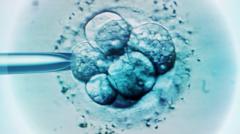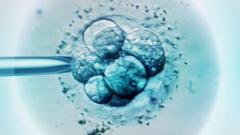In a groundbreaking achievement, a team of scientists from Oregon Health and Science University has announced the successful creation of early-stage human embryos by manipulating DNA sourced from human skin cells. This innovative technique could potentially revolutionize fertility treatments, providing options for individuals facing infertility due to age or health concerns.
The new method allows for the possibility of utilizing almost any cell in the body as a starting point for creating life, potentially enabling same-sex couples to have genetically related children.
The procedure involves removing the nucleus, which contains the complete genetic code, from a skin cell and placing it inside a donor egg devoid of its own genetic material. This technique is similar to the one used in cloning Dolly the Sheep in 1996.
Although the researchers successfully produced 82 functional eggs, only a few progressed to the embryonic stage, and none developed beyond six days. Experts caution that the technique requires significant refinement before it can be used in fertility clinics.
Prof. Shoukhrat Mitalipov, director of the gene therapy center at OHSU, emphasized that while this achievement is promising, it remains a scientific discovery rather than a clinical solution. It’s essential to discuss the implications of such advancements with the public to build trust and ensure ethical governance.
Citing the importance of continued dialogue on reproductive science, other experts in the field echo the sentiment that while creating new eggs represents significant progress, safety concerns remain paramount.
Looking ahead, this research signifies a leap into a future where individuals struggling with infertility, whether due to age, illness, or treatment effects, may be able to conceive children with their genetic material, marking a profound shift in the landscape of reproductive options.














